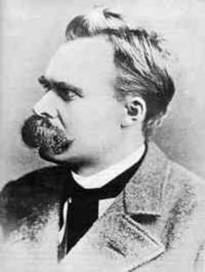February 12, 2006
We want it all
 |  |
What use might Nietzsche be today? Or, to put it another way: which Nietzsche might be of use, now?
It will come as no surprise that I would count Nietzsche the perspectivist - he who questioned not only the possibility but the value of Truth - as the enemy. There will be even fewer surprises that I would reject the Dionysian Nietzsche, the celebrant of transgressive desire. This Nietzsche, in any case, is largely a post-Bataillean retrospective construct (even in The Birth of Tragedy, Nietzsche mourns is the lost tension between Dionysus and Apollo; and in his later writings Nietzsche is more likely to be found extolling the necessity of constraints and limitations than he is to be heard calling for the unrestrained venting of libido). The perspectival and the Dionysiac are far too timely.
The Nietzsche that remains untimely - and by that I do not mean outmoded, very far from it - is Nietzsche the aristocrat. Nietzsche should not be taken seriously as a political theorist, at least not at the level of his positive prescriptions. But the Nietzsche who denounces the insipidity and mediocrity that result from democracy's levelling impulses could not be more acute. Passage after passage of polemic in Beyond Good and Evil seems uncannily aposite in these times of focus-grouped blandness and 'autonomous herding'. Nietzsche's real interests lay with cultural politics; government and social institutions troubled him only insofar as they produced cultural effects, his ultimate question being: 'What are the conditions in which great cultural artifacts can emerge?'
I was reminded of Nietzche's warnings about what would happen to culture if all 'special claims and privileges' are denied, if the very concept of superiority is abolished, when Chantelle Houghton won Celebrity Big Brother a week or so ago (it already seems much longer than that). I was reminded, too, of Nietzsche's scalding admonition that 'harshness' and 'cruelty' must be cultivated if the human animal is to transformed, by hammer blows and force of will, into a great work of art; reminded, especially, when some posters on Dissensus were seriously advancing 'niceness' - niceness, that is - as a desirable trait.
Chantelle's victory wasn't just a popularity contest: as Marcello's excellent Big Brother piece observed, a principle was at stake, the principle that ordinariness must trump any notion of superiority.
'“You are not going to win support or respect by placing yourself out of the ordinary…You need to be approachable but you also need to be yourself. That’s what young people respect.” That’s a recent quote from one Alex Folkes, the speaker for a pressure group named Votes at Sixteen, apropos George Galloway, and it’s the kind of exhausting, fatuous anti-philosophy which tempts me to form a pressure group called Votes at Thirty. Nevertheless it is (un)pretty fitting for an age bereft of desire for godhood. Where once we assembled in front of screens or stages to gasp in awe at people doing and achieving things we could never hope of doing or achieving ourselves – but how we luxuriated, carried ourselves afloat, on the dream of doing so – now all we require is a humbling mirror. This is the sort of thing which stops dangerous people from gaining power, but also the kind of closure which would ultimately forbid all art.'
Where once we assembled in front of screens or stages to gasp in awe at people doing and achieving things we could never hope of doing or achieving ourselves ... now all we require is a humbling mirror. This is Celebreality: the simultaneous desublimation of the Star and the elevation of 'the ordinary'.
The commentary on Celebrity Big Brother treated it as self-evident that people will want to 'identify with' media figures who offer a comforting and unchallenging reflection of themselves at their most mediocre, stupid and harmless. Julie Burchill's endlessly reiterated polemic in favour of Big Brother - that it allows working class people opportunities to break into a media otherwise dominated by the privileged - is baseless for three reasons. First, because the real beneficiaries of Big Brother are not the contestants, whose 'career' is notoriously short-lived, but Endemol, with its coterie of smug graduate producers. Second, because Big Brother trades in a patronising and reductive image of the working class. The dominion of Celebreality relies upon the mediocrats inducing the working class into corresponding to - and 'identifying with' - that image. Third, because Big Brother and reality TV have effaced those areas of popular culture in which a working class that aspired to more than 'wealth' or 'fame' once excelled. Its rise has meant a defeat for that over-reaching proletarian drive to be more, (I am nothing but should be everything), a drive which negated Social Facts by inventing Sonic Fictions, which despised 'ordinariness' in the name of the strange and the alien. On Celebrity Big Brother, Pete Burns, with his casual cruelties, his savage articulacy and his Masoch-furs, was a cartoon symbol of those lost ambitions, skulking and sulking at the periphery, a Glam prince in an age of post-Blairite roundheads.
We all know that the 'reality' of reality TV is an artful construction, an effect not only of editing but of a Lorenzian rat-in-a-mirrored-labyrinth artificial environment which attenuates psychology into a series of territorial twitches. The 'reality' that is designated is significant more for what is absent from it than for any positive properties it is deemed to possess. And what is absent, above all, is fantasy. Or rather, fantasy objects.
We once turned to popular culture because it produced fantasy objects; now, we are asked to 'identify with' the fantasising subject itself. It was entirely appropriate that, the week after Chantelle won Celebrity Big Brother, Smash Hits should have announced its imminent closure.
Smash Hits began just as the Glam continuum was winding down. What Smash Hits took from punk was its least Nietzschean affect, namely its 'irreverence'. In the case of Smash Hits, this amounted to a compulsory trivialization coupled with a kind of good-humoured debunking of the pretensions of Stardom. Behind Smash Hits' silly surrealism was good solid commonsense and a conflicted desire, to both have your idols and kill them. Heat was Smash Hits' successor and what rendered it obsolete. No need to bother with the (Pop) pretext now you can consume celebrity directly, untroubled by Pop's embarrassing Dreams. Chantelle is the logical conclusion of the process: the anti-Pop anti-Idol.
Nietzsche's contention was that the kind of levelling Chantelle stands for was the inevitable and necessary consequence of all egalitarianism. Yet popular culture was once the arena which demonstrated that any genuine egalitarianism is inimical to any such levelling down. I wrote last year of Goth as 'a paradoxically egalitarian aristocracy in which membership [is] not guaranteed by birth or beauty but by self-decoration'; will popular culture ever again teach us that egalitarianism is not hostile to, but relies upon, a will-to-greatness, an unconditional demand for the excellent?
Posted by mark at February 12, 2006 11:11 PM | TrackBack